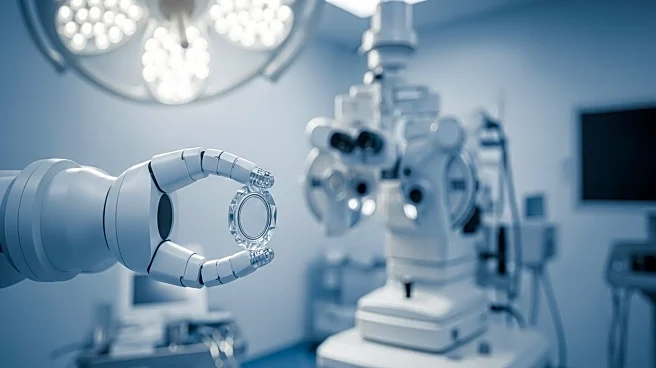What is the story about?
What's Happening?
ForSight Robotics, founded in 2020 by Dr. Joseph Nathan, Professor Moshe Shoham, and Dr. Daniel Glozman, is pioneering the Oryom platform, a robotic system designed for eye surgery. The platform aims to perform complex procedures such as cataract removal with micron-level precision, using AI and advanced computer vision. The company has secured $125 million in Series B funding to accelerate its growth and is preparing for its first in-human clinical trials. The Oryom platform is expected to enhance surgical accuracy and expand access to ophthalmic care globally, addressing the anticipated doubling of cataract prevalence by 2050.
Why It's Important?
The development of the Oryom platform is significant as it addresses the growing demand for cataract surgeries amidst a declining number of trained ophthalmic surgeons. By reducing intraoperative time and minimizing surgeon fatigue, the platform can increase surgical throughput, particularly in underserved regions. This innovation not only promises improved patient outcomes but also aims to democratize access to high-quality eye care, potentially reducing preventable blindness worldwide. The integration of robotics in ophthalmic surgery represents a transformative shift in healthcare, offering 'superhuman' dexterity and precision.
What's Next?
ForSight Robotics is focused on scaling its technology to mass-commercialize the Oryom platform, targeting the U.S. market first, followed by regions like India, China, and the Middle East. The company plans to expand its services to treat additional eye conditions, including glaucoma and retinal diseases, leveraging its technology's ability to access every part of the human eye. As the platform undergoes clinical trials and regulatory approvals, ForSight is investing in comprehensive training programs to ensure safe and precise outcomes, addressing concerns from practicing ophthalmic surgeons.
Beyond the Headlines
The introduction of robotic systems in eye surgery raises ethical and cultural considerations, particularly in terms of accessibility and the potential displacement of traditional surgical roles. The platform's ability to perform surgeries with micron-level precision could redefine surgical standards, prompting discussions on the balance between human skill and technological intervention. Additionally, the focus on underserved regions highlights the broader implications for global health equity, as the platform could bridge gaps in healthcare access and quality.















